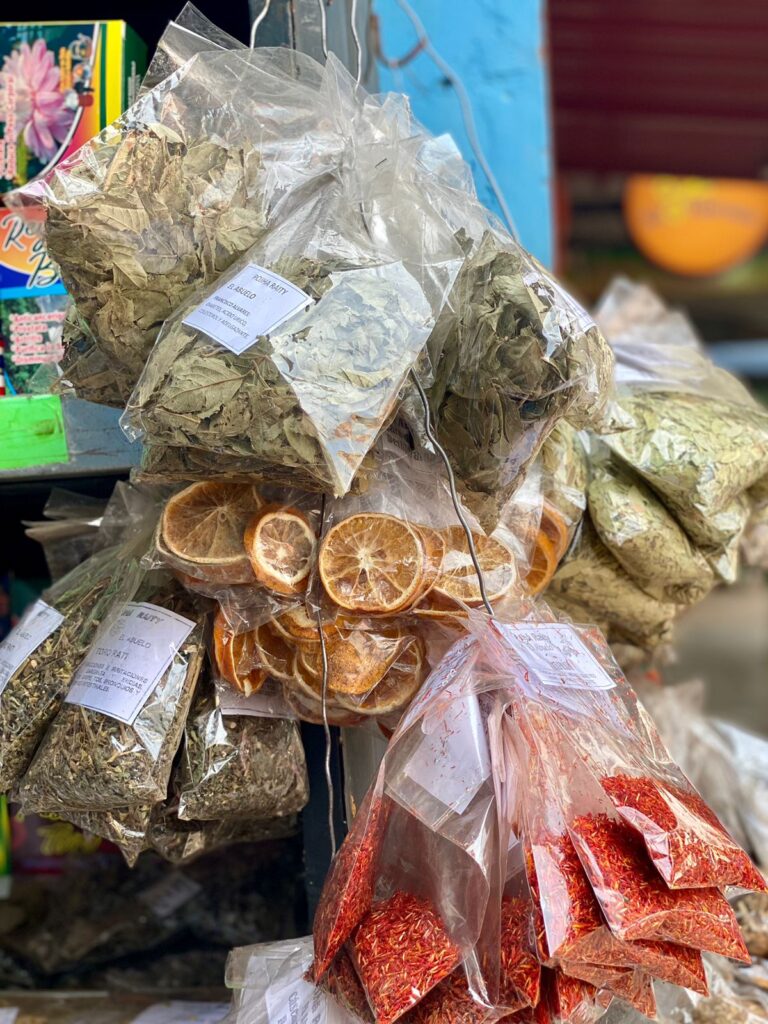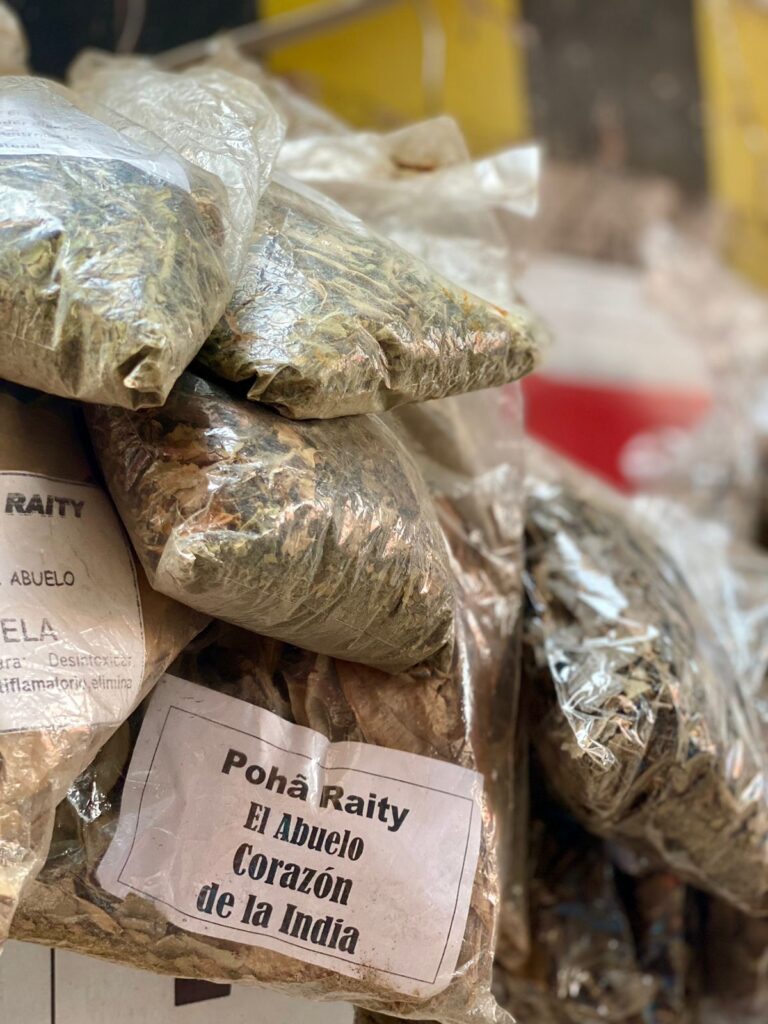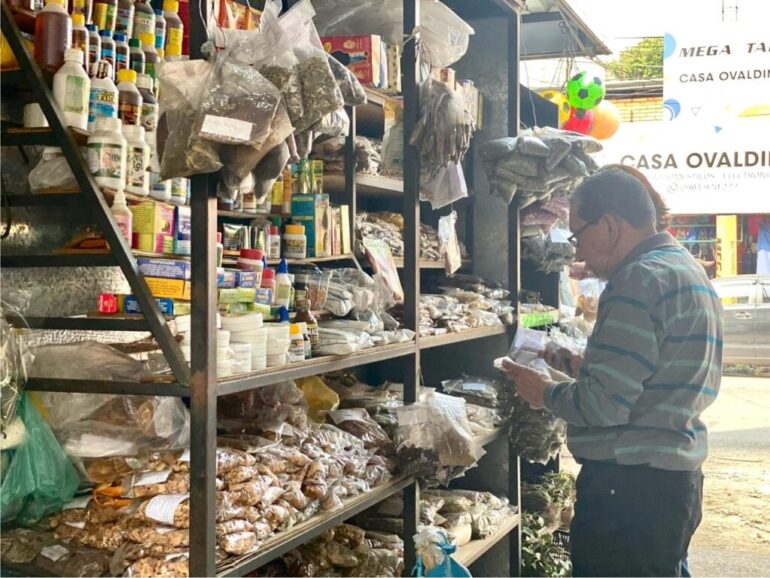Today, 22nd August, Paraguay celebrates “Folklore Day”, a day dedicated to remembering ancient traditional wisdom passed down through the generations in Guarani culture. In addition to stories and beliefs, knowledge of nature and the application of traditional plant-based medicines are at the forefront of traditional folklore. Today, Paraguayans all across the country are reminded of the deep connection between the cultural identity of Paraguayans and nature itself.

In the heart of the bustling market of San Lorenzo, Juan Benegas, known to all as “Grandfather,” is one of those who keeps alive an ancestral tradition. At his outlet “Poha Raity”, he is a guardian of knowledge about natural remedies, medicinal plants and their application in daily life.
Benegas offers a variety of herbs and medicinal plants, and has a deep understanding about each of them, along with its benefits, and how to properly prepare and use them. Here he talks us through some of the most common ones, as well as some of his personal favourites.
- Cangoroza: This plant is known for its antispasmodic properties, being useful for relieving cramps and muscle aches. In addition, it is used in intimate hygiene and to treat wounds and eczema on the skin. It is also credited with treating prostate problems.
- Marcela: Much appreciated in traditional medicine, Marcela is excellent for improving digestion and relieving colds and asthma. In addition, it is used in the treatment of diabetes and to mitigate colic, cramps, and regulate menstruation.
- Heart of India: This plant is especially valued for its ability to combat insomnia and nerve alterations, helping to induce sleep and calm nerves.
- Yate-i Kaa: Ideal for treating digestive problems such as gases and colic, it is also recommended to relieve an inflamed appendix.
- Toro Rati: Used to treat irritations of the throat and gums, this remedy is effective against flu, cough, bronchitis and to relieve intestinal gases.
- Francisco Álvares: This remedy is an ally in the control of diabetes, uric acid, and cholesterol. He is also known for his slimming properties, helping with weight loss.
- Salvia: Sage is an excellent stomach tonic, used as a diuretic and to treat nerve problems. It also stimulates appetite and is useful in the treatment of sores and ulcers.
- Yagua Rundi: This plant is traditionally used to relieve convulsive cough, colds and flu, helping to calm the airways.
- Ajenjo: Known for its ability to relieve colic and stomach pains, wormwood is an effective remedy for those suffering from digestive problems.
- Clavo de olor: This powerful remedy helps in blood clotting and reducing blood sugar levels. In addition, it has anti-inflammatory and analgesic properties.
- Boldo: Much used as a digestive, bold also functions as a painkiller and is effective at treating liver conditions and to calm the nervous system.
- Borraja: Dracking is a natural remedy against constipation, and is effective in treating post-nose drip and flu, relieving respiratory symptoms.
- Urusu he’ẽ: This remedy is mainly used to treat aphony, being a good expectorant and laxative. In addition, it is useful as a diuretic and for treating colds and kidney stones.
- Hinojo: Balances the functions of the digestive system and is known for being an expectorant and anti-inflammatory. It also helps with urine emission, being useful for people with a tendency to be obesity due to fluid retention.
- Maíz de malva: This remedy is especially suitable for treating ovarian infections, helping to fight infections in the female reproductive system.
- Cola de caballo: With diuretic properties, the horsetail helps reduce fluid retention and has antioxidant and anti-inflammatory effects. It is also effective in increasing urination.
- Ka’a he’ẽ: This plant is used to treat arthritis, obesity, depression, and high cholesterol. In addition, it acts as a digestive and is useful in the treatment of rheumatism.
- Ñandypa: Known as a natural slimming, this remedy is effective in the fight against fats, helping in the weight loss process.
- Cebada: Traditionally used as antipyretic, barley is effective in reducing fever and alleviating discomfort associated with colds and flu.

However, alongside traditional wisdom passed down through generations, it is important to remember that advances in modern science and medicine should also be considered. Dr Robert Núñez, a pediatrician, stresses that these type of herbal remedies are often not recommended for children – and that the application of modern medicinal treatments have significantly improved the mortality rate of children compared to generations ago.
The immaturity of the infants’ immune system means that they cannot properly metabolize certain substances, warns Núñez. He explains that adverse gastrointestinal reactions, such as vomiting and diarrhea, can lead to dehydration and, in extreme cases, death. Besides, Dr. Núñez highlights a common risk in the use of alternative medicine: the delay in medical consultation. Sometimes, people rely so much on these remedies that they do not seek timely medical care, which can result in late diagnoses and serious complications, including death, he emphasises.
On this Folklore Day, while celebrating our roots and customs, it is vital to remember that ancestral wisdom and modern science can coexist. The key is to use them in an informed and prudent way, so that our health, like our traditions, flourishes in balance.



Very much needed for Guaraní homework